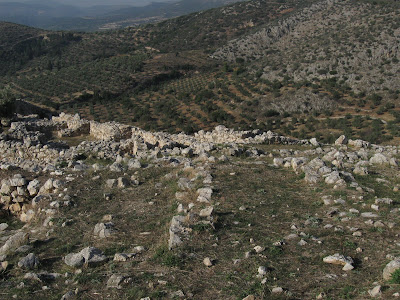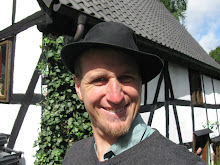 Almost at Mykines. It's hard getting the road-sign in the picture when you are taking the photo yourself.
Almost at Mykines. It's hard getting the road-sign in the picture when you are taking the photo yourself.It’s fitting that on such a journey, I don’t take the quickest route to Mykines. From Athens’ train station, by train along the coast to the tiny isthmus (now bisected by a canal) that makes the Peloponese a peninsula. I get off at a phantom-like station, in between the ruins of an ancient, wealthy city (Corinth) and a somewhat limping-stray-dog new one (Korinthos). Three bus journeys and some supermarket olives and bread later I am walking a narrow road through fields of orange trees that seem to be singing to me in Ancient Greek. I’m on my way to Mycenae.
The village of Mykines understands why people come here. Almost every shop has windows filled with its hoards of ‘museum replica’ statuettes and urns. Much better than seeing ‘I tried to find Ancient Greece and all I got was this stupid T-shirt’ at any rate.
And then I see it, crowning a foothill, perched majestically, the site of a centre of government and commerce from more than three thousand years ago. The walls so formidable that later greeks named them after the giants they believed to have built them: Cyclopean.
Guarding a pass, with a view over the plain below, the place is powerful. And the surroundings are beautiful. The now-familiar greek terrain, parched, stony and semi-barren, weathered cones, scraggy with limestone lie behind me, and in front, plains planted with olives and oranges stretch in a wide vista towards the haze-disguised hills thirty kilometres away. Sitting in a tiny cube walled by stone, once a guard room at the gates of Mycenae, I reflect on the journey that brought me here.
As exhausting as it has been fufilling, as wondrous as it has been tedious: it has been a time of extremes. The big pull to come, and the reason I am still in Europe, has been my dear, generous, loving and very lovable British family, the hefty clan, from Douglas and Sarah in Newcastle to Tullis now in Barcelona. In fact, through my conversations with Nana and Grandad, I’ve got a sense of my tipuna, my ancestors; a process that led me to stand with cousin Alison at my maternal Great-grandparents grave. Coming to know my kin, young and old, has given me an valuable sense of connection with my past, with the world outside my own skin. I’ve been learning my whakapapa.
In other ways too, I’ve seen what has largely influenced our pakeha culture in New Zealand. Our culture’s genealogy. The marks that this continent, splintered by mountain ranges and great rivers and human squabbling into various language groups and cultures, uniting again under a common bureacracy and currency and through the steadily increasing osmosis and flux of immigration.
I’ve glimpsed some of the peculiarities of anglophone culture, having being asked to view it from Nordic, Central European, Mediterranean and Germanic cultures. Our subtlety (or dissemblance) the flexiblilty (or rootlessness) of our language; our strong grasp on personal liberty (or selfishness). I’ve seen Kiwi culture through another’s eyes too. ‘you’re all so relaxed’ they say. (really?)
I’ve been motivated to learn languages that meant nothing to me when they belonged in textbooks, all linked (except for Hungarian) by that mysterious ancestor ‘Indo-european’
I’ve been surprised by insightful expressions and delighted by exotic sounds. I’ve been stared at by kids in incredulity when I fail to grasp the meaning of their sentences.
It’s been an emotional journey too. Countless shrugs and glares (luckily nothing more hostile) have been directed at this witless foreigner in a dozen countries. On the other hand, even more people have opened their minds, their homes and their hearts to me.
It has been a year and half of this, two trips around Europe, thousands of kilometres by bus, train, bike, hitching, boat and two flights. About 50 nights with 13 different couch-surfing ehosts, 35 in my tent, including 13 wild camping, 15 in hostels and the odd cheap hotel, The bulk of nights staying with friends, family or employers. I’ve been paid to decorate flats, pick grapes, pack hampers, assist in a library, wash dishes and barbeque wurst. and converted money between eleven different currencies. I’ve set foot in 18 different countries and said ‘thank you’ in 14 seperate languages. And I’m getting ready to say goodbye to Europe. It just might take some time.

















